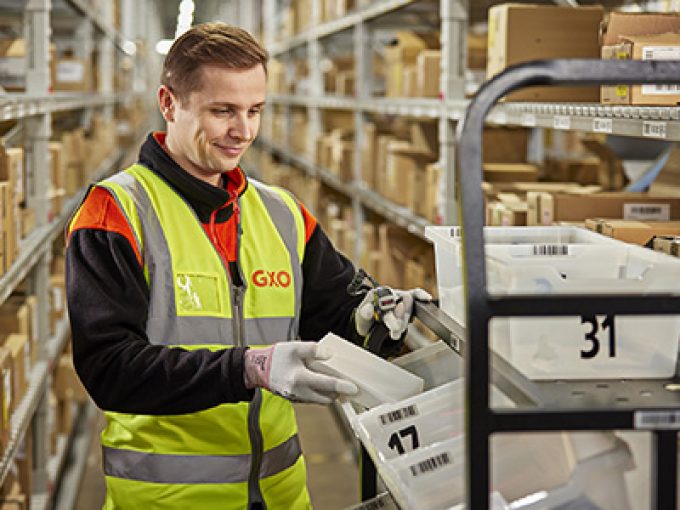GXO Logistics CEO Malcolm Wilson to retire next year
GXO Logistics has announced that its chief executive officer, Malcolm Wilson, has informed the board ...
FDX: ABOUT USPS PRIVATISATIONFDX: CCO VIEWFDX: LOWER GUIDANCE FDX: DISRUPTING AIR FREIGHTFDX: FOCUS ON KEY VERTICALFDX: LTL OUTLOOKGXO: NEW LOW LINE: NEW LOW FDX: INDUSTRIAL WOESFDX: HEALTH CHECKFDX: TRADING UPDATEWMT: GREEN WOESFDX: FREIGHT BREAK-UPFDX: WAITING FOR THE SPINHON: BREAK-UP ALLUREDSV: BREACHING SUPPORTVW: BOLT-ON DEALAMZN: TOP PICK
FDX: ABOUT USPS PRIVATISATIONFDX: CCO VIEWFDX: LOWER GUIDANCE FDX: DISRUPTING AIR FREIGHTFDX: FOCUS ON KEY VERTICALFDX: LTL OUTLOOKGXO: NEW LOW LINE: NEW LOW FDX: INDUSTRIAL WOESFDX: HEALTH CHECKFDX: TRADING UPDATEWMT: GREEN WOESFDX: FREIGHT BREAK-UPFDX: WAITING FOR THE SPINHON: BREAK-UP ALLUREDSV: BREACHING SUPPORTVW: BOLT-ON DEALAMZN: TOP PICK

In today’s fast-paced omnichannel environment, consumers want it all, from next-day deliveries to seamless returns and in-store availability. Managing, or even exceeding, these expectations requires a smooth logistics operation that’s up to the challenge.
Yet, for emerging and established brands alike, it can feel like an uphill battle to maintain control of logistics, and costs, while navigating volatile demand, growing regulation and a difficult macro-economic environment. With the need for speed growing and the focus shifting to sustainability, businesses must streamline operations, gain visibility and reduce the financial impact of their logistics.
Multi-user fulfilment allows companies of all sizes to take advantage of first-class logistics at economies of scale, accessing agile and resilient outsourced logistics expertise to adapt to ever-changing market conditions. Here, we explore the five challenges that commonly hold retailers back from logistics success and demonstrate how to overcome them to create a truly flexible and future-proofed logistics operation to underpin retail success.
Many retailers find that as their business evolves, their logistics can’t keep pace with new technologies and innovations, which can restrict their growth. Yet with inflationary pressures, economic uncertainty and unpredictable demand weighing heavily, brands are understandably cautious when it comes to investing in their supply chain.
Plugging into shared logistics is one of the easiest ways in which retailers can control their costs without compromising on growth. Contracting the space they need when they need it means that innovative logistics become far more affordable through shared economies of scale. And it’s not just physical space, sharing infrastructure offers access to complex support services like cyber protection and leading warehouse management systems at a fraction of the usual investment.
In a world of accelerated trend cycles and aggressive competition, accurate forecasting can prove all but impossible. Add to this ongoing geopolitical tensions and trade disruptions and it’s easy to see it’s ever more challenging to respond to dynamic demand.
Agile resourcing to scale up and down quickly in line with unpredictable shifts in demand is a must. Retailers need a partner with a diverse set of capabilities, from effective space utilisation and highly flexible labour pools to data-driven real-time demand insights to right-size operations.
Consumers today expect it all and customer satisfaction is central to every retail operation. A difficult returns process may mean a customer is lost forever while little extras can boost loyalty.
Brands can gain a significant strategic advantage by harnessing the power of value-added services, from returns, repairs and gift-wrapping to carrier management, co-packing and Click & Collect. A key consideration is choosing exactly the ones required for the operation to help optimise efficiency, yield cost savings and make the customer experience extraordinary.
To stay ahead of the competition, retailers must embrace innovation. But tracking ongoing technological developments, and discerning between the hype and reality around this topic, can be a full-time job in itself.
In a shared solution environment, continuous improvement and the latest technology becomes more accessible. From the introduction of scanners to automated order-picking systems or even plugging into a network of cobots, partnering with leading logistics specialists and utilising a shared-user site enables retailers the opportunity to take advantage of new technologies sooner than they might have thought possible.
As consumers increasingly vote with their wallets for retailers prioritising environmental practices, sustainability is a key consideration for retailers of all sizes. Yet the focus must be on embracing green operations without sacrificing business success.
Ongoing collaboration with a logistics partner can help to introduce innovative, sustainability-led business models with big impacts. Solutions that support the circular economy, from more effective returns management to a comprehensive repairs operation, can eliminate a significant proportion of waste, while a pre-loved proposition could open up new revenue streams.
While retailers want to maintain control over their logistics as they grow, market unpredictability, increasing complexity and fast-moving technology are now outpacing the ability of many to navigate a clear path forward alone.
No matter the stage of your journey, or your size, GXO Direct’s shared warehousing offers expertise, resources and capacity on demand. Retailers can rapidly plug into the services they need, play with new solutions that add real value for their customers and seamlessly scale operations as growth opportunities emerge.
To find out more, download our new ebook, Five ways to unlock retail success in an era of evolution, today.
Comment on this article